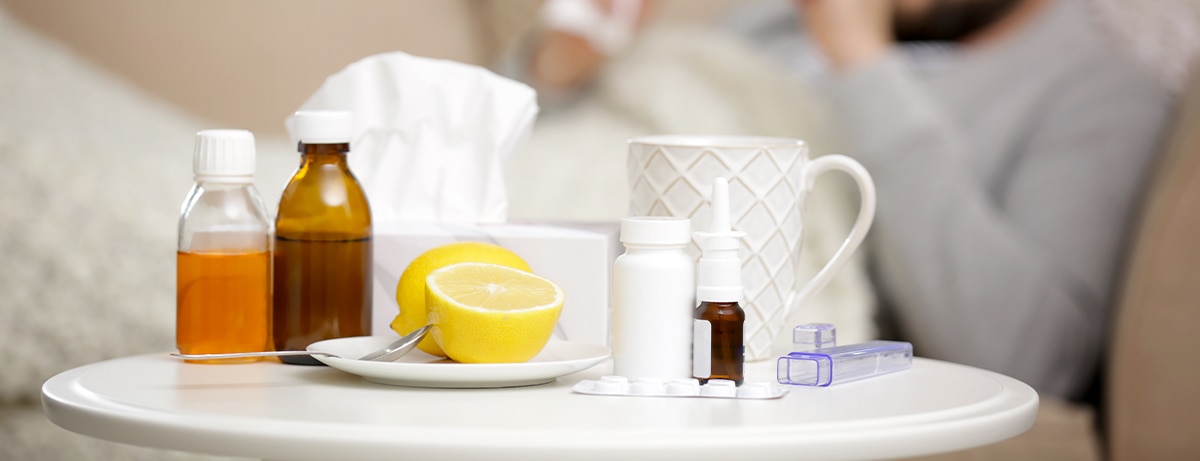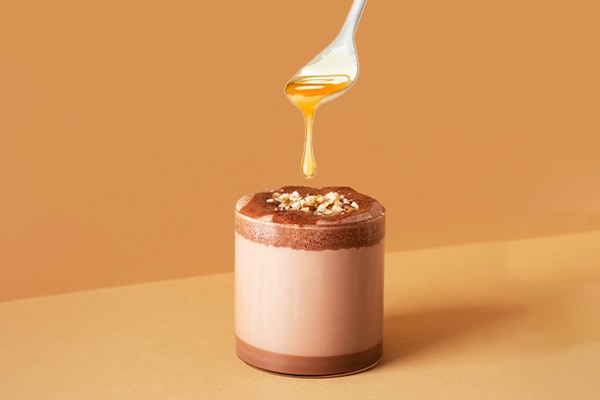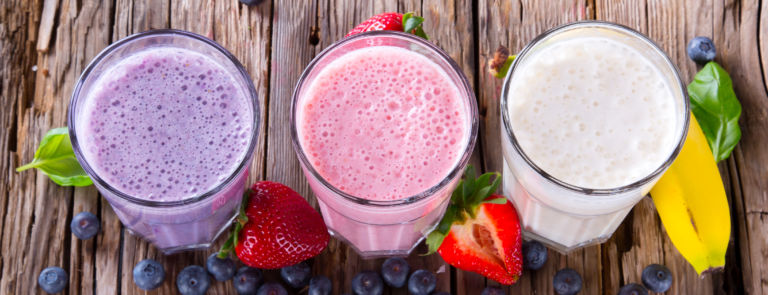20% off £30
The A-Z guide to cold & flu

Should you stay at home if you have a cold? And when will you feel like yourself again?
There’s more to colds and flu than just a sniffle. In fact, there’s a whole alphabet’s worth...
Aches
Both colds and flu can leave you feeling achy. ¹ ²
You can take paracetamol or ibuprofen to help lower your temperature and ease aches and pains. ¹ ²
Bin it
Bin used tissues as soon as you’ve finished with them to help minimise the spread of germs. Don’t leave them lying around or save them for later!
Cold
- A blocked or runny nose
- A sore throat
- Headaches
- Coughs and sneezing
- A raised temperature
- Muscle aches
- Pressure in your ears or face
- Loss of taste and smell
You’ll usually recover within a week or two without needing to see your GP. Drink plenty of water and get lots of rest. ¹
Dehydration

Exhaustion
Flu
Flu is a respiratory virus, which means it affects your nose, throat, and lungs.
Most people will begin to feel better within about a week, but it can be more dangerous for some people. ³
Flu symptoms can include: ²
- A sudden high temperature
- An aching body
- A dry cough and sore throat
- A headache
- Diarrhoea, stomach pain, or feeling/being sick
Good hygiene
It’s important to build good hygiene habits all the time, not just when you’re ill.
Most importantly: ⁴
- Wash your hands regularly and thoroughly
- Stay home when you’re ill
- Avoid touching your eyes, nose, and mouth where you can
- Cover your mouth and nose when you sneeze or cough
- Regularly disinfect frequently-touched surfaces (like your kitchen counters, computer keyboards, and door handles)
Happy birthday
To make sure you’re washing your hands properly, wash for as long as it takes you to sing “Happy Birthday” twice (about 40 seconds).
The NHS has a helpful guide and video showing you how to wash your hands.

Ibuprofen
Joints
Kids’ cold & flu
Children pick up bugs like cold and flu much more easily and more often, because:
- Their immune systems aren’t fully developed ⁵
- They’re more likely to touch items, share toys, or put things in their mouth
- They’re less likely to follow good hygiene practices like proper handwashing
In fact, it’s common for kids to have 8 or more colds per year. ⁵
Kids’ flu symptoms might be slightly different to adults’. They might have pain in their ears or seem less energetic than usual. ²
For both cold and flu, babies might have fewer wet nappies than usual due to dehydration. ⁶
Loss of taste
A cold can leave you with a loss of taste. This is a symptom that can also happen with Covid-19, so it’s a good idea to take a lateral flow test. ⁷
If it’s a cold, your sense of taste should return as you recover without any extra measures.

Manuka honey
Nausea
Flu can leave you feeling sick or cause you to be sick. Drink plenty of water to avoid dehydration, especially if you’re sick. Take regular sips instead of drinking a lot in one go.
Oranges
Many people think that vitamin C can help prevent a cold or speed up your recovery...but, according to the NHS, there’s not enough evidence to support this. ¹
However, it helps support our normal immune function, which is always important!
It’s best to get your vitamins through food if possible. Oranges are famously high in vitamin C, but a bell pepper has over three times the amount! ⁸ ⁹
So, eat the rainbow and you’ll get the vitamins you need to support you day-to-day.
Paracetamol
You can take paracetamol to help ease symptoms of cold and flu, like aches and a high temperature. ¹ ²
Again, make sure not to take it alongside other cold and flu medications, as you may end up taking more than the recommended amount. ¹

Quantity of fluids
Recovery
Sneezing
We all know sneezing’s common with a cold. But why?
You sneeze when something irritates your nose, as your body’s way of expelling it out.
When you have a cold, the body releases inflammatory mediators to help fight the virus. These inflammatory mediators irritate the nose, leaving you reaching for the tissues.
Temperature
If you have a cold or flu and a high temperature, stay at home and avoid contact with other people until you feel better. Paracetamol and ibuprofen may help lower your temperature. ¹ ²
See a GP if: ¹
- Your temperature suddenly becomes very high, or if you feel hot and shivery
Call 111 or see a GP immediately if: ¹¹
- Your baby is less than 3 months old and has a temperature of 38°C or more
- Your baby is over 3 months old and has a temperature of 39°C or more
Upset stomach
You won’t usually have stomach problems with a cold. But the flu may make you feel sick, be sick, or have diarrhoea. ²

Vaccine
Wash your hands
Remember to wash your hands (or use an alcohol-based hand sanitiser if soap and water aren’t available): ¹⁴
- After using the toilet or changing a nappy
- Before eating or handling food
- Before and after handling raw foods like meat, fruit, and vegetables
- After sneezing, coughing, or blowing your nose
- After touching animals (including pets) and their food or cages
- Before and after treating a cut or wound
eXtra rest
Whether it’s cold or flu, you’ll need to get lots of rest. Sleep is when your body recovers - so don’t power through your usual activities if you’re feeling unwell.
You
You know how you’re feeling better than anyone. So, if something feels wrong or you’re worried about the way your symptoms are progressing, speak to your GP or call 111.
Call 999 or go to A&E if: ²
- You get sudden chest pain
- You have trouble breathing
- You start coughing up a lot of blood

Zinc
The final say
The advice in this article is for information only and should not replace medical care. Please check with your GP or healthcare professional before trying any supplements, treatments or remedies. Food supplements must not be used as a substitute for a varied and balanced diet and a healthy lifestyle.
Before taking any supplements or minerals, it’s best to make sure you’re getting all the nutrients through your diet first.
Food supplements must not be used as a substitute for a varied and balanced diet and a healthy lifestyle.
- https://www.nhs.uk/conditions/common-cold/
- https://www.nhs.uk/conditions/flu/
- https://www.bupa.co.uk/newsroom/ourviews/seasonal-flu
- https://www.cdc.gov/flu/prevent/actions-prevent-flu.htm
- https://www.nhs.uk/conditions/baby/health/colds-coughs-and-ear-infections-in-children/
- https://www.nhsinform.scot/illnesses-and-conditions/lungs-and-airways/if-your-child-has-cold-or-flu-symptoms
- https://www.bhf.org.uk/informationsupport/heart-matters-magazine/news/coronavirus-and-your-health/coronavirus-symptoms-cold-flu-or-coronavirus
- https://fdc.nal.usda.gov/fdc-app.html#/food-details/2258591/nutrients
- https://fdc.nal.usda.gov/fdc-app.html#/food-details/169918/nutrients
- https://www.nhsinform.scot/illnesses-and-conditions/infections-and-poisoning/flu
- https://www.nhs.uk/conditions/fever-in-children/
- https://www.nhs.uk/conditions/vaccinations/flu-influenza-vaccine/
- https://www.nhs.uk/conditions/vaccinations/child-flu-vaccine/
- https://www.nhs.uk/live-well/best-way-to-wash-your-hands/















